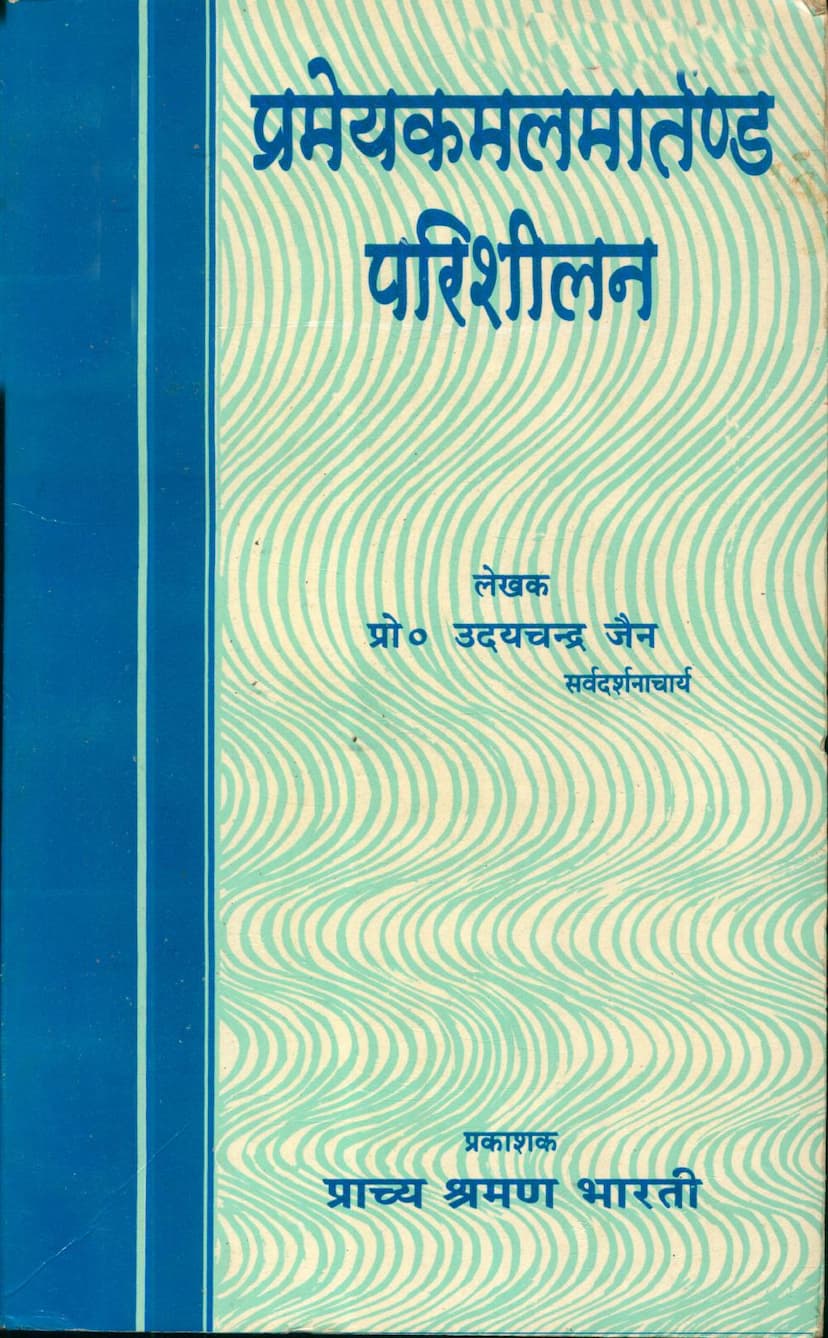Prameykamalmarttand Parishilan
Added to library: September 2, 2025

Summary
Certainly! Here is a comprehensive summary of the Jain text "Prameykamalmarttand Parishilan" by Udaychandra Jain, based on the provided pages:
Book Title: प्रमेयकमलमार्तण्ड परिशीलन (Prameykamalmarttand Parishilan) Author: Prof. Udaychandra Jain Publisher: Prachya Shraman Bharati
Overview:
"Prameykamalmarttand Parishilan" is a detailed examination and commentary on the seminal Jain philosophical work, "Prameyakamalamartanda," authored by Acharya Prabhachandra. Acharya Prabhachandra's "Prameyakamalamartanda" is a vast (approximately 12,000 verses) and highly influential commentary on Acharya Manikyanandi's "Parikshamukha Sutra," a foundational text in Jain Nyaya (logic and epistemology).
The book, "Prameykamalmarttand Parishilan," by Prof. Udaychandra Jain, aims to make the profound and often complex philosophical insights of Acharya Prabhachandra's work accessible in a simplified and modern style for students and general readers. It seeks to clarify prevalent misconceptions about Jain philosophy, particularly its classification as "nāstika" (heterodox) by some, emphasizing that Jainism firmly upholds concepts like the soul, God (in the form of liberated souls), karma, heaven, and hell, thus being fundamentally "āstika" (orthodox).
Key Themes and Structure:
The book is structured as a meticulous analysis of "Prameyakamalamartanda," covering a wide array of philosophical topics debated within Indian thought. Prof. Udaychandra Jain's work is not merely a translation but a scholarly engagement that elucidates the intricate arguments and refutations presented by Acharya Prabhachandra.
The summary highlights several crucial aspects:
-
Jain Nyaya: It emphasizes the significant place of Jain Nyaya within the broader spectrum of Indian philosophy, acknowledging the contributions of pioneers like Acharya Samantabhadra and Acharya Akalankadeva, and placing Acharya Prabhachandra within this esteemed lineage.
-
Acharya Prabhachandra's Contribution: The book underscores how Acharya Prabhachandra's "Prameyakamalamartanda" (along with his commentary on "Lagiyasatraya," "Nyayakunadachandra") filled a critical void by providing extensive and original philosophical discourse, making the original texts more understandable despite their complexity.
-
Comprehensive Critique of Other Philosophies: "Prameyakamalamartanda," as analyzed in this commentary, systematically presents the core tenets of almost all major Indian philosophical schools (e.g., Buddhism, Sankhya, Yoga, Nyaya, Mimamsa, Vedanta, Charvaka) as purvapaksha (initial arguments). It then rigorously refutes these opposing views with strong evidence and logical reasoning, establishing the validity of Jain philosophy (jaindarshan). This makes the study of "Prameyakamalamartanda" a gateway to understanding the entirety of ancient Indian philosophy.
-
The Meaning of "Prameyakamalamartanda": The title itself is explained as being apt, akin to the sun ("Martanda") that opens lotuses ("Kamala"), the work elucidates and reveals the "Prameya" (objects of valid knowledge), akin to lotuses.
-
Structure of the Analysis (Chapters):
- Chapter 1: Discusses the general definition of Pramana (means of valid knowledge), various philosophical viewpoints on its nature (e.g., kārakasākalya, sannikarshavada, indriyavritti, jñātṛvyāpāra), refutes Buddhist nirvikalpaka pratyaksha (non-discursive perception), shabdādvaitavāda (monism of sound), and analyzes samsaya (doubt), viparyaya (misapprehension), and their various interpretations.
- Chapter 2: Focuses on Pratyaksha Pramana (direct perception), refuting the pratyakshaikpramanavada (theory of perception as the sole valid means of knowledge) of the Charvakas. It discusses the two types of perception: mukhya pratyaksha (pure/direct perception) and sāmvyavaharika pratyaksha (conventional perception), and critically examines concepts like sarvajñatva (omniscience), ishvarakartṛtva (God as creator), prakṛtikartṛtva (nature as creator), moksha (liberation) across different philosophies, and the controversial topics of kevalibhukti (eating by the liberated) and strīmukti (liberation for women).
- Chapter 3: Deals with Paroksha Pramana (indirect knowledge), analyzing smriti (memory), pratyabhijñāna (recognition), tarka (reasoning), anumana (inference), and agama (testimony). It clarifies the Jain position on the validity of these and refutes opposing views, particularly from Mimamsa and Buddhism. It also elaborates on the structure of inference (anumana) and the concept of hetu (reason) and hetvabhāsa (fallacies of inference), along with discussions on vād, jalpa, vitanda, chala, jati, and nigrahastāna (modes of debate and their fallacies).
- Chapter 4: Examines the Vishaya (object of knowledge), elaborating on the Jain concept of anekānta (non-absolutism) and syādvāda (conditional predication) as the correct understanding of reality, contrasting it with ekānta (one-sided views) of other schools. It discusses sāmānya (generality) and vishesha (particularity), refuting the views of Buddhism, Nyaya-Vaisheshika, and debating concepts like brahmanatva-jati (caste of Brahman), kshanabhangavāda (momentariness), and the nature of substance (dravya).
- Chapter 5: Focuses on the Phala (result or fruit) of Pramana and Pramāṇābhāsa (fallacies of valid knowledge), discussing concepts like ajñānanivritti (cessation of ignorance) and its relationship with hānoppadana (abandonment and acceptance).
- Chapter 6: Concludes by detailing various ābhāsa (fallacies) related to all categories of knowledge (pratyakshābhāsa, anumānābhāsa, āgamābhāsa, etc.), the dynamics of debate (jay-parajaya), and the classification of naya (standpoints) and saptabhangi (the sevenfold approach to predication).
-
Inspiration and Dedication: The book is dedicated to the revered Digambara Jain Muni, Upadhyay Shri Gyansagarji Maharaj, whose inspiration and blessings were instrumental in its creation. The author expresses profound gratitude for his guidance and the insights gained from studying various Nyaya texts.
-
Publisher's Note: The publisher, Prachya Shraman Bharati, established in 1991, expresses pleasure in publishing this work, fulfilling a need for a simplified and accessible study of "Prameyakamalamartanda" for students and the general public. They also thank the financial contributor, Shri Vinaykumar Ashokkumar Jain.
In essence, "Prameykamalmarttand Parishilan" serves as a vital resource for understanding the depth and breadth of Jain logic and epistemology as articulated by Acharya Prabhachandra, presented with scholarly clarity by Prof. Udaychandra Jain. It is a testament to the rich intellectual heritage of Jainism and its contribution to Indian philosophy.